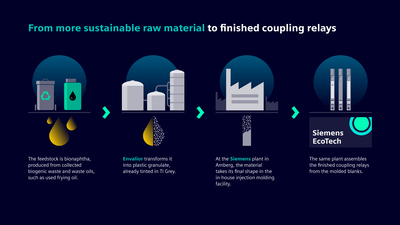Siemens opts for plastic made from used cooking oil

Siemens Smart Infrastructure has collaborated with Envalior on a sustainable series of coupling relays with housing made from Envalior’s Akulon K225-KS B-MB plastic, which consists of 70% material derived from biomass waste.
The plastic’s raw material comes from used cooking oil (UCO), left over after frying in the food industry, restaurants, snack bars and households. As UCO is no longer suitable for human or animal consumption, it does not compete with food or animal feed production.
While UCO is mainly used for biodiesel, Envalior uses it for the production of engineering plastics based on a mass balance concept, avoiding incineration. The company is a global supplier of high-performance engineering materials.
“Collaborating with Envalior to create this bio-based plastic is an important step towards advancing the use of more sustainable materials in our electrical products. We are pleased to work with Envalior as another strong partner on our journey towards a more environmentally friendly portfolio,” said Andreas Matthé, CEO of Electrical Products at Siemens Smart Infrastructure.
The new coupling relay comes in three variants to suit a wide range of industrial requirements.
The first variant with integral relay output is specially designed for harsh environmental conditions, as well as for areas with specific safety requirements. These relays have safety-ready characteristic values (B10d values) and are also approved for use in potentially explosive atmospheres (ATEX certified). This variant is optionally available with gold-plated contact elements for switching very low currents, or with printed circuit boards with a protective coating, which are suitable for railway applications.
As a second variant, plug-in coupling relays are available for applications that require quick relay replacement during operation. They are also available as an option with gold-plated contacts.
Thirdly, for applications requiring very fast, soundless and frequent switching, Siemens offers a variant with semiconductor output. As it has a virtually infinite service life, according to the company, it can be used in situations where replacing conventional relays is expensive and time-consuming. Siemens said it has been able to increase the switching capacity of these semiconductor variants to up to 6 A, enabling them to match the performance of conventional elementary relays.
Designed to be sustainable throughout their life cycle, from development to the end of service life, the SIRIUS 3RQ4 coupling relays meet the strict criteria of the Siemens EcoTech label. This includes 33% lower energy losses in the semiconductor variant compared to previous versions, as well as eliminating problematic materials such as PFAS. In addition, the product can be easily dismantled and recycled at the end of its life.
As well as being bio-based, Akulon K225-KS B-MB is halogen-free and flame-retardant. The polyamide 6 grade plastic material is characterised by high heat resistance and robust chemical resistance, and is used in many electrical engineering and power distribution applications.
“At Envalior, we are proud to have partnered with Siemens in the development of the SIRIUS 3RQ4 coupling relay series. A key success factor in this project was achieving excellent flow behaviour in thin-wall designs and a UL94 V-0 rating at just 0.4 mm thickness, while simultaneously achieving an outstanding green share from bio-waste sources but at prime quality,” said Dr Marc Rudolf, Global Key Account Manager, Envalior.
The new coupling relays have been designed and intensively tested for use in combination with Siemens controllers. Further sustainability measures include fully automated production of the relays at Siemens’ plant in Amberg, which shortens the supply chain in the German and European markets, and more sustainable cardboard packaging for shipping.
Energy regulator gives verdict on Project Marinus
Tasmania and Victoria's planned energy and communications upgrade has taken another step...
SA Power Networks combats insulator pollution
The South Australian utility has established a multidisciplinary taskforce to tackle what has...
Keeping Australia's power systems stable: AEMO report
The 2025 Transition Plan for System Security explains how the nation can meet its system security...





